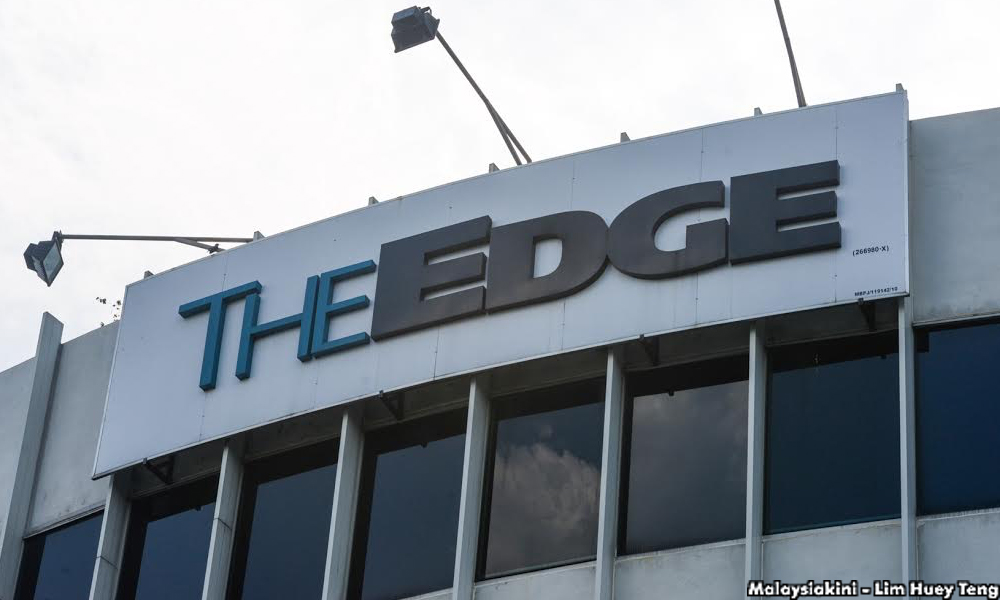The high-handed response by politicians and corporate leaders to critical news reports is becoming increasingly common. The criminal defamation charge against The Edge is the latest case.
The Edge said in a statement: “We are baffled as to why the police and the deputy public prosecutor’s (DPP) office of Kuala Lumpur are pressing criminal defamation charges against us for informing investors about stock market manipulation.
“If the complainant, who is a private businessperson, feels that we have defamed him, the police and DPP should ask him to file a civil suit against us instead of using public resources.”
Here’s how the Bar Council explains the difference between criminal and civil defamation.
In a nutshell, the key difference is in the penalty. When it comes to criminal defamation, it is imprisonment. In a civil case, it is financial compensation.
Both are taken to accumulatively inhibit, intimidate and silence journalists.

Former The Edge journalist, P Gunasegaram, said the “heinous” criminal charge would effectively “hinder them (journalists) in their legitimate work”.
That is the occupational dilemma. Journalists are sued by politicians and corporate leaders if they cross any undetectable red line, and damned by their readers if they don't.
Is investigative journalism in the Malaysian context an ideal sought-after work but seemingly hard to reach?
Yes, it feels that way, even though the Internet has given journalists and readers more avenues to collaborate in exposing the underbelly of the corporate world and backdoor deals in the political arena.
So, as we watch the case against The Edge drag on to an uncertain outcome, what can readers do to support and sustain the journalist’s function as the people’s watchdog? What can readers do to shelter journalists from the gathering storm of legal threats?
At its most basic, readers should persist in engaging with journalists in reporting the issues that affect their daily lives.

A strong public conscience will, I hope, emerge to act as a countervailing force to the crippling trend of defamation threats and actions.
Where can we see signs of this public conscience emerging?
The signs are in the readers’ comments section and letters to the editor, even if the depth of the comments varies from nonsensical to well-considered. It is the latter that matters.
Readers who know more about the intricacies of certain issues than journalists have a responsibility to alert the latter to factual and contextual inaccuracies in their stories.
Of course, this raises the need for readers’ comments to be fair, accurate and evidence-based. What are the alternative angles to the news reports? Are readers sufficiently conscientious to clarify the issues that the journalist might have overlooked?
Or does the comments section merely provide a space for readers to vent their frustration against a dysfunctional political system?
To an extent, readers are the journalists’ “eyes and ears” on the ground. Readers are like “informants”, the journalist’s Deep Throat if you like. They are justice collaborators sharing information to show that there are more than two sides to a story.
Hence this principle - the quality of journalism can only be as good as the readers’ capacity to engage with journalists in clarifying complex issues in the context of how and why things happen the way they do.
Journalist-readers cooperation
This journalist-audience collaboration in producing accurate accounts was evident during Covid-19 when the media were badly affected by industry closures.
The Guardian was a case in point. Financial support and information sharing by readers helped power the news portal’s coverage through the lockdown.
Which explains the open call by media outlets on their readers to share sensitive information with journalists – all for the sake of reporting on the human condition in words and imageries that accumulatively represent the “truth”.
These news outlets, for instance, have clear guidelines on how readers can tip off journalists - The Age, ABC News, Sydney Morning Herald and The Guardian in Australia; Washington Post, New York Times, and Associated Press; and The Telegraph in the UK.
So, how can Malaysian readers engage with journalists and get their attention?
Information is a journalist’s lifeblood. Hence, always read up on what you are criticising before leaping into a fiery argument without evidence.
If you think the journalist had misinterpreted the issue, do your research. What sources did the journalist overlook? How did other news outlets – local and overseas – report on the issue?
Finally, avoid reacting with derogatory remarks, which could be libellous. They neither add value to the discussion nor raise the quality of journalism, which is what we need badly these days. - Mkini
ERIC LOO is a former journalist and educator in Australia, and a journalism trainer in parts of Asia.
The views expressed here are those of the author/contributor and do not necessarily represent the views of MMKtT.




No comments:
Post a Comment
Note: Only a member of this blog may post a comment.